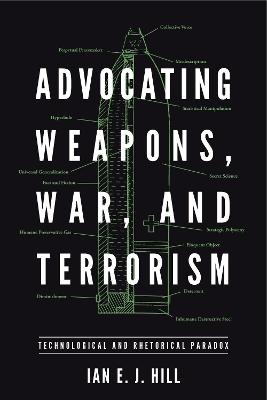
Advocating Weapons, War, and Terrorism
Technological and Rhetorical Paradox
Seiten
2018
Pennsylvania State University Press (Verlag)
978-0-271-08123-6 (ISBN)
Pennsylvania State University Press (Verlag)
978-0-271-08123-6 (ISBN)
Examines commonplace conflicting beliefs that technology will either annihilate humanity or preserve humanity from annihilation. Argues that the paradoxical capacities of weapons influence how humanity understands violent conflict.
Technē’s Paradox—a frequent theme in science fiction—is the commonplace belief that technology has both the potential to annihilate humanity and to preserve it. Advocating Weapons, War, and Terrorism looks at how this paradox applies to some of the most dangerous of technologies: population bombs, dynamite bombs, chemical weapons, nuclear weapons, and improvised explosive devices.
Hill’s study analyzes the rhetoric used to promote such weapons in the nineteenth and twentieth centuries. By examining Thomas R. Malthus’s Essay on the Principle of Population, the courtroom address of accused Haymarket bomber August Spies, the army textbook Chemical Warfare by Major General Amos A. Fries and Clarence J. West, the life and letters of Manhattan Project physicist Leo Szilard, and the writings of Ted “Unabomber” Kaczynski, Hill shows how contemporary societies are equipped with abundant rhetorical means to describe and debate the extreme capacities of weapons to both destroy and protect. The book takes a middle-way approach between language and materialism that combines traditional rhetorical criticism of texts with analyses of the persuasive force of weapons themselves, as objects, irrespective of human intervention.
Advocating Weapons, War, and Terrorism is the first study of its kind, revealing how the combination of weapons and rhetoric facilitated the magnitude of killing in the nineteenth and twentieth centuries, and illuminating how humanity understands and acts upon its propensity for violence. This book will be invaluable for scholars of rhetoric, scholars of science and technology, and the study of warfare.
Technē’s Paradox—a frequent theme in science fiction—is the commonplace belief that technology has both the potential to annihilate humanity and to preserve it. Advocating Weapons, War, and Terrorism looks at how this paradox applies to some of the most dangerous of technologies: population bombs, dynamite bombs, chemical weapons, nuclear weapons, and improvised explosive devices.
Hill’s study analyzes the rhetoric used to promote such weapons in the nineteenth and twentieth centuries. By examining Thomas R. Malthus’s Essay on the Principle of Population, the courtroom address of accused Haymarket bomber August Spies, the army textbook Chemical Warfare by Major General Amos A. Fries and Clarence J. West, the life and letters of Manhattan Project physicist Leo Szilard, and the writings of Ted “Unabomber” Kaczynski, Hill shows how contemporary societies are equipped with abundant rhetorical means to describe and debate the extreme capacities of weapons to both destroy and protect. The book takes a middle-way approach between language and materialism that combines traditional rhetorical criticism of texts with analyses of the persuasive force of weapons themselves, as objects, irrespective of human intervention.
Advocating Weapons, War, and Terrorism is the first study of its kind, revealing how the combination of weapons and rhetoric facilitated the magnitude of killing in the nineteenth and twentieth centuries, and illuminating how humanity understands and acts upon its propensity for violence. This book will be invaluable for scholars of rhetoric, scholars of science and technology, and the study of warfare.
Ian E. J. Hill is Assistant Professor in the History and Theory of Rhetoric at the University of British Columbia and an affiliate faculty member of the Graduate Program in Science and Technology Studies.
Contents
AcknowledgmentsIntroduction: Technē’s Paradox and Weapons Rhetoric1. Thomas Malthus’s Population Bomb as a Pre-Text for Technē’s Paradox2. Preaching Dynamite: August Spies at the Haymarket Trial3. Humane, All Too Humane: The Chemical-Weapons Advocacyof Major General Amos A. Fries4. Toward a Peaceful Bomb: Leo Szilard’s Paradoxical Life5. Industrial Antipathy: Irreparability and Ted Kaczynski’s IEDsConclusion: In the Presence of Weapons and RhetoricNotesBibliographyIndex
| Erscheinungsdatum | 06.11.2018 |
|---|---|
| Reihe/Serie | RSA Series in Transdisciplinary Rhetoric |
| Verlagsort | University Park |
| Sprache | englisch |
| Maße | 152 x 229 mm |
| Gewicht | 476 g |
| Themenwelt | Geisteswissenschaften ► Geschichte ► Regional- / Ländergeschichte |
| Geschichte ► Teilgebiete der Geschichte ► Technikgeschichte | |
| Sozialwissenschaften ► Kommunikation / Medien ► Allgemeines / Lexika | |
| Sozialwissenschaften ► Kommunikation / Medien ► Kommunikationswissenschaft | |
| Sozialwissenschaften ► Politik / Verwaltung | |
| ISBN-10 | 0-271-08123-6 / 0271081236 |
| ISBN-13 | 978-0-271-08123-6 / 9780271081236 |
| Zustand | Neuware |
| Haben Sie eine Frage zum Produkt? |
Mehr entdecken
aus dem Bereich
aus dem Bereich
Buch | Softcover (2024)
Lehmanns Media (Verlag)
CHF 27,90
Digitalisierung neu denken für eine gerechte Gesellschaft
Buch | Hardcover (2023)
Quadriga (Verlag)
CHF 27,95
Vom Perceptron zum Deep Learning
Buch | Softcover (2022)
Springer Vieweg (Verlag)
CHF 27,95


